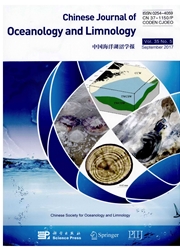

 中文摘要:
中文摘要:
A bstract Pelagic copepods play an important role in the marine food web. However, a full understanding of the ecological status of this zooplankton group depends on the careful study of their natural diets. In previous PCR-based copepod diet studies, we found many apostome ciliates that live symbiotically under the exoskeleton of the copepods, and their sequences were often over-represented in the 18S rRNA gene(18S rDNA) libraries. As a fi rst step to address this issue, we designed three apostome ciliate 18S rDNA blocking primers, and tested their blocking effi ciency against apostome ciliate 18s rDNA under various PCR conditions. Using a semi-quantitative PCR method, we optimized the conditions to effi ciently amplify the 18S rDNA of the prey while simultaneously excluding the symbiotic apostome ciliates. This technique will facilitate PCR-based diet studies of copepods and other zooplankton in their natural environments.
 英文摘要:
英文摘要:
Pelagic copepods play an important role in the marine food web. However, a full understanding of the ecological status of this zooplankton group depends on the careful study of their natural diets. In previous PCR-based copepod diet studies, we found many apostome ciliates that live symbiotically under the exoskeleton of the copepods, and their sequences were often over-represented in the 18S rRNA gene (18S rDNA) libraries. As a first step to address this issue, we designed three apostome ciliate 18S rDNA blocking primers, and tested their blocking efficiency against apostome ciliate 18S rDNA under various PCR conditions. Using a semi-quantitative PCR method, we optimized the conditions to efficiently amplify the 18S rDNA of the prey while simultaneously excluding the symbiotic apostome ciliates. This technique will facilitate PCR-based diet studies of copepods and other zooplankton in their natural environments.
 同期刊论文项目
同期刊论文项目
 同项目期刊论文
同项目期刊论文
 Detection of Prorocentrum minimum (Pavillard) Schiller with an Electrochemiluminescence-Molecular Pr
Detection of Prorocentrum minimum (Pavillard) Schiller with an Electrochemiluminescence-Molecular Pr 期刊信息
期刊信息
